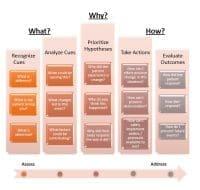Sometimes, I get really sick of talking about customer service.
I’ve worked in various hospital settings where the push for nurse scripting is so fervent that nurses are given handouts with lines to memorize. If I wanted to perform monologues, I would have pursued theater.
Honestly, I didn’t get it. Why was there such a push to make nursing a customer service field, when the goal of nursing wasn’t necessarily to keep the “customer” happy? Nursing could not and should not be a customer service field.
Or so I thought.
I recently interviewed at a large insurance company, and despite my extensive preparation, one question threw me off: “Do you have any customer service experience?”
The interviewer was looking at my resume, which made it clear not only that I was a nurse in various acute care settings but I also had more than 3 years of direct patient care experience.
I paused. Was she asking me to summarize my bedside duties? “You mean as a nurse?” I asked. Her reply: “No, have you ever worked at like, a Taco Bell?”
I admit I was confused at first. Her question made me feel that my 3 years of bedside experience suddenly meant so much less, because I had never worked in another “customer service” industry. Did she not know how many warm blankets I had given out or how many times I had trekked back and forth to the pantry to fetch juice and crackers? Was she really saying that a cashier in a fast-food drive-thru has more customer service experience than I do?
And then it hit me: The nurses of yore would be turning over in their graves if I let myself think that being a nurse means I know nothing about customer service, and that my duties as a nurse are equivalent to duties of those in other “customer service” roles (spoiler alert: they’re not).
Nursing, I realized, is the ultimate customer service profession.
Let’s break it down: Customer service is provided to those, the customers, seeking a service or product. There is a certain expectation of outstanding customer service—goals are accomplished correctly and thoroughly, with clear and professional communication. In customer service, the customer is always right, and the objective is keeping the customer satisfied.
As nurses, we know that our patients aren’t always very happy. Sometimes, they’re downright disgruntled and rightly so; however, in this case, maybe happiness isn’t the right goal. If you asked patients if they would rather be happy or would rather have error-free care and a positive clinical outcome, I’m sure they would say both together are ideal. If they could really only choose one though, which would they choose? Think about it: Nurses may not always be able to keep the “customer” satisfied (think, enforcing visitor policies or keeping patients NPO for longer than they’d like), but nurses play a pivotal role in ensuring safe and high-quality care. If that’s the real goal, then everyone is happy in the end, right?
Not so fast.
Remember those lines and those acronyms we’re supposed to memorize? They’re not going away. Here’s why: In addition to measuring care quality measures, the government actually wantsto make sure patients are happy, too. To top it off, the government makes it about, no surprise here, money.
The Hospital Consumer Assessment of Healthcare Provider Survey (HCAPHS) is the Medicare-approved survey tool used to measure patient satisfaction. Extensive research went into the process of determining that the results from this survey be as unbiased as possible. The survey, which consists of 29 questions, measures the patient’s perception of his or her hospital experience. In 2005, hospitals were required to collect and submit HCAPHS data to qualify for their annual incentives paid by a department of the Centers for Medicare and Medicaid. Scores are published for the public, serving as further motivation for hospital organizations to increase their scores.
As of 2010, under the Affordable Care Act, HCAPHS scores were included among the measures to calculate value-based incentive payments. Though the scores aren’t solely responsible for Medicare’s decision to reimburse, any percentage withheld can amount to a very large sum of money. This explains why organizations are so enthusiastic about developing methods to increase scores.
So what do we do?
It’s in the nursing job description to mitigate error and use keen clinical judgement. What is not always mandatory is the customer service aspect—going above and beyond when we know we don’t have to. As nurses, we’ve seen how simple acts of even basic kindness can enhance the care we provide, and affect the entire patient experience. If employers want us to deliver speeches, fine, as long as they don’t take away the nurse’s right to decide when traditional customer service measures can be put on the backburner in order to protect what really matters. Saving lives and ensuring the best outcomes don’t always mean we’re providing “customer service,” but what matters the most? It surely cannot be money.
No one likes being a customer when it comes to healthcare. I know I certainly don’t. (They say nurses make the worst patients!). As nurses or patients, we know that the service provided can greatly impact patient experience. Shouldn’t we do the best we can to positively influence patient satisfaction, even if it isn’t our first priority? We can save someone’s life andmake them smile: If that’s not customer service I don’t know what is.
Abbi Lamparelli is a clinical analyst at RWJBarnabas Health in West Orange, New Jersey.
Reference
Centers for Medicare and Medicaid Services. HCAHPS: Patients’ perspectives of care survey. cms.gov/Medicare/Quality-Initiatives-Patient-Assessment-Instruments/HospitalQualityInits/HospitalHCAHPS


















